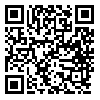BibTeX | RIS | EndNote | Medlars | ProCite | Reference Manager | RefWorks
Send citation to:
URL: http://ijme.mui.ac.ir/article-1-3636-en.html
Introduction: Understanding the process of empowerment and promoting universities’ capabilities to create an empowered atmosphere are factors affecting functions of education which require identification of the strategies and effective factors in faculty members’ empowerment. The present study was conducted to identify and determine the most appropriate strategies of educational empowerment for faculty members of medicine from the viewpoints of faculty members of Mashhad School of Medicine. Methods: This descriptive cross-sectional study was conducted in 2012 in Mashhad School of Medicine. Initially, a list of appropriate strategies to empower faculty members was extracted from reviewing documents, literature, and experts’ opinions then, a researcher-made questionnaire was developed based on the list, and after verifying the content validity and reliability by means of test-retest (correlation coefficient at 0.87), was distributed among 96 faculty members (20 faculty members of basic sciences, 76 clinical faculty members) who were selected through stratified random sampling. Each strategy was evaluated as appropriate (3), rather appropriate (2) or inappropriate (1). Data were analyzed using descriptive and inferential statistics (Mann-Whitney and Kruskal-Wallis). Results: The strategies of workshops, observation of the best performance, short-term training courses and fellowship were the most appropriate strategies with means of 2.33, 2.42, 2.51, and 2.59, respectively while monitoring professors’ performance was identified as an inappropriate strategy. Results showed that the strategies of workshops, short-term training courses and fellowship were correlated with the age of faculty members (p<0.05). No significant correlation was found between the strategy of observation of the best performance and faculty members’ age and also between the most appropriate educational empowerment strategies and other individual characteristics of faculty members (gender, type of faculty member, academic ranking, academic degree, type of employment and working experience) (p>0.05). Conclusion: The findings of this study could be helpful for managers, instructors and planners of empowerment courses for faculty members.
Received: 2015/02/23 | Accepted: 2015/07/12 | Published: 2015/09/26 | ePublished: 2015/09/26
| Rights and permissions | |
 |
This work is licensed under a Creative Commons Attribution-NonCommercial 4.0 International License. |




